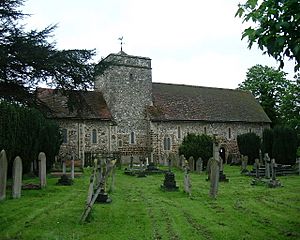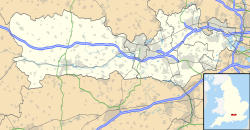St Laurence's Church, Upton-cum-Chalvey facts for kids
Quick facts for kids Church of Saint Laurence,Upton-cum-Chalvey |
|
|---|---|
 |
|
| 51°30′08″N 0°35′18″W / 51.5023°N 0.5884°W | |
| Location | Upton Court Road, Slough SL3 7LS |
| Country | England |
| Denomination | Church of England |
| Churchmanship | Liberal Anglo-Catholic |
| Website | Saint Laurence's Church |
| History | |
| Founded | 12th century |
| Administration | |
| Parish | Upton-cum-Chalvey |
| Deanery | Burnham and Slough |
| Diocese | Oxford |
| Province | Canterbury |
Saint Laurence's Church is a very old church in Slough, Berkshire, England. It is one of the oldest buildings in the entire area! This church is part of the Church of England.
The church you see today has parts that are hundreds of years old. In the 1100s, a wooden church was replaced with a stone building. The tower and outer walls of this original building are still part of the church. These old parts show a style called Norman architecture. Some walls are even made of a special rock called puddingstone. You can also see an old baptismal font and a piscina, which is a stone basin used for washing sacred items.
During a time called the English Reformation, many old decorations in the church were damaged. However, a special image from the 1200s, showing the Trinity (God the Father, Son, and Holy Spirit), survived. It was put back together when the church was fixed up later.
Contents
Saving a Historic Church
How St Laurence's Was Saved
By the early 1800s, Saint Laurence's Church was in very bad shape. It was so damaged that people decided to build a new church, called St Mary's, in the town center. It looked like the old Norman building might be torn down.
But a local farmer stepped in to save it! He made sure the outside walls and tower were secure. This stopped the church from being destroyed.
Restoring the Church Building
Saint Laurence's Church was later fully repaired and made beautiful again. This happened in 1850 and 1851. A famous architect named Benjamin Ferrey led this restoration work. The church was officially opened again on December 2, 1851.
Famous People Connected to the Church
Poets and Their Inspiration
The churchyard of Saint Laurence's might have inspired a famous poem. The poet Thomas Gray (1716–1771) lived nearby. His well-known poem, Elegy Written in a Country Churchyard, was published in 1751. Many believe the "ivy-mantled tow’r" he wrote about was Saint Laurence's tower. This tower had a bell that rang every evening, marking the end of the day.
Astronomers and Discoveries
The famous astronomer and composer Sir William Herschel (1738–1822) is buried at Saint Laurence's. He is known for discovering the planet Uranus. Sir William, his wife, and his grandson are all buried in a family vault near the church tower. There are special plaques on the wall to remember them.
In 2001, new stained-glass windows were added to the church. These beautiful windows celebrate Herschel and his amazing discovery of Uranus.
Other Notable Burials
Many other interesting people are buried at Saint Laurence's. John Sullivan (1788–1855) is buried in the churchyard. He was an important official in India and founded the city of Ooty.
Another notable person buried here is Charles Hatchett (1765–1847). He was a scientist who discovered the element niobium.
The poet and translator Keith Bosley was also the church's organist for many years.
 | Toni Morrison |
 | Barack Obama |
 | Martin Luther King Jr. |
 | Ralph Bunche |


